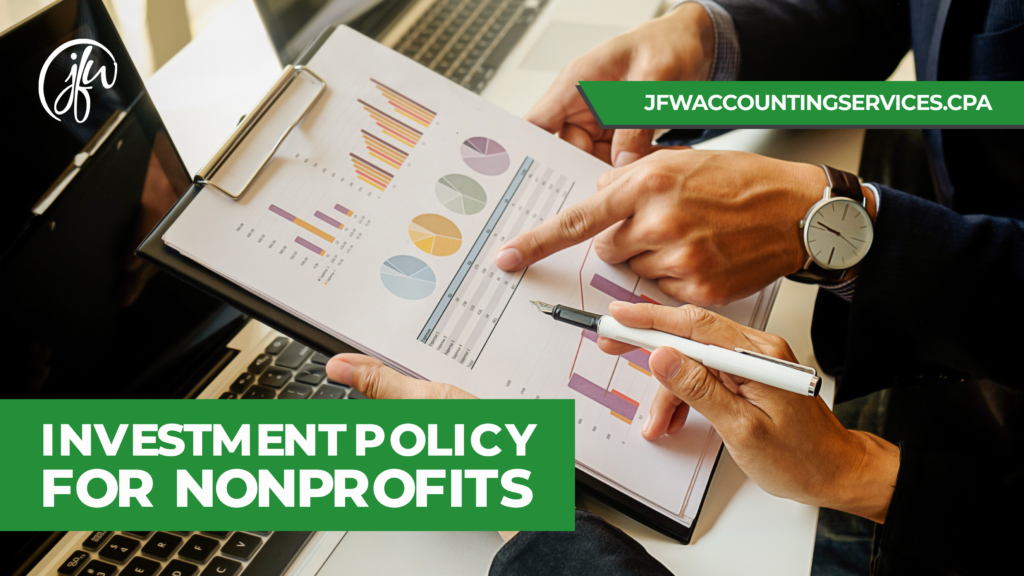Investments are a vital part of long-term growth strategies for nonprofit organizations. Leaders and board members of nonprofit entities hold a fiduciary responsibility to protect the nonprofit’s financial health and ensure that the mission is being fulfilled in the most efficient ways possible. Using investment tools and securities is a powerful way for nonprofits to secure their future and grow their organization.
Why and How Should Nonprofits Invest?
Nonprofit organizations are accustomed to using collected funds to support their projects and overall mission, but there are many benefits for the entities that also choose to invest a portion of those received revenues. Starting an investment portfolio or investment plan can benefit a nonprofit organization because it builds assets, facilitates savings, and eases large contributions.
Building Assets
As nonprofits grow their organization, the balance of their operating account should be growing as well. Organizations that choose to invest in addition to fundraising and other revenue-raising activities are able to reach their financial goals more quickly than those that do not invest funds.
The financial health of an organization is determined by evaluating multiple factors, but a large contributor to that analysis is balance sheet assets. Organizations with investment portfolios are able to increase the overall asset balance on their financial statements allowing them to provide a more robust financial image to grant-makers, auditors, donors, and potential contributors.
Savings
There are many reasons that a nonprofit organization benefits from long-term savings. The entity may be planning for a large expenditure, like building a school, group home, or other large capital expenditure. They may be saving to fund scholarships or other massive projects.
When organizations are routinely setting aside funds for a future purpose, they are saving. It makes the most sense for the funds to earn investment income. Low-risk investment options will give the organization the opportunity to continue building capital for a future purpose while growing the balance of that fund.
Large Contributions
Many nonprofit organizations depend on contributions from their supporters. Creating an investment plan helps to encourage large gifts in two ways.
Having an established investment plan is attractive to donors. For those that are considering large contributions, reassurance that the funds will not be immediately depleted can be beneficial. Understanding that all or a portion of their donation will be incorporated into an existing portfolio, tells the donor that their money is going to help the cause for many years. Contributors are also more likely to donate to an organization with strong asset balances, such as those with working investment portfolios.
Another important reason that nonprofit organizations should have an investment plan is to accommodate non-cash gifts. Organizations that have a brokerage account for investments can receive charitable contributions in the form of investment securities, including stocks and bonds. These forms of donations are mutually beneficial to the potential contributor because they are more tax-efficient than cash donations. Donors are often able to avoid paying capital gains tax on donated securities.
How to Develop An Investment Plan
Creating an investment committee is the first step for nonprofit organizations that have decided to move forward with investment activities. Making the investment committee usually consists of putting together an investment group within the nonprofit. The small group should consist of board members that have some investment experience and a documented interest in the nonprofit’s success. Once there are
Creating an investment plan is the first step for nonprofit organizations that have decided to move forward with investment activities. Making the investment plan usually consists of putting together an investment group within the nonprofit. The small group should consist of board members that have some investment experience and a documented interest in the nonprofit’s success.
Once there are elected decision-makers in place, the organization can create an Investment Policy Statement (IPS). The IPS is a document that gives general rules and information about the investment activities of the organization. The statement often includes the purpose for investments, which explain the goals of the organization. The IPS is used by the organization, the investment committee, and a portfolio manager or other external financial planner.
The Investment Policy Statement of a nonprofit organization may include:
- General information about the nonprofit – Background information about the entity including a summary of the organization’s mission and the roles and responsibilities of key board members.
- Investment objectives – Financial goals of the organization and purpose of investments
- Investment concerns – Information regarding the timeline, liquidity concerns, and any applicable tax requirements.
- Other requirements and preferences – Information about allowable assets, reporting standards, and other relevant details for an investment manager.
The IPS remains within the nonprofit and becomes a portable and surviving document, meaning that it is transferrable in the event of board or investment committee member changes. The statement acts as a guide for the active investment portfolio. Since the document remains a stable document in the nonprofit, it is important that it is frequently reviewed and updated when necessary. There are many resources and templates available to nonprofits wishing to create an investment policy.
Final Thoughts
Investing activities benefit nonprofit organizations because it facilitates long-term savings, increase assets, and encourage large contributions. The first step for entities that wish to benefit from investment activities is to create an investment plan and follow through with an Investment Policy. Reaching out to a tax expert or accounting consultant is recommended before embarking on new investment activities.

Jo-Anne Williams Barnes, is a Certified Public Accountant (CPA) and Chartered Global Management Accountant (CGMA) holding a Master’s of Science in Accounting (MSA) and a Master’s in Business Administration (MBA). Additionally, she holds a Bachelor of Science (BS) in Accounting from the University of Baltimore and is a seasoned accounting professional with several years of experience in the field of managing financial records for non-profits, small, medium, and large businesses. Jo-Anne is a certified Sage Intacct Accounting and Implementation Specialist, a certified QuickBooks ProAdvisor, an AICPA Not-for-Profit Certificate II holder, and Standard for Excellence Licensed Consultant. Additionally, Jo-Anne is a member of American Institute of Certified Public Accountant (AICPA), Maryland Association of Certified Public Accountants (MACPA), and Greater Washington Society of Certified Public Accountants (GWSCPA) where she continues to keep abreast on the latest industry trends and changes.

